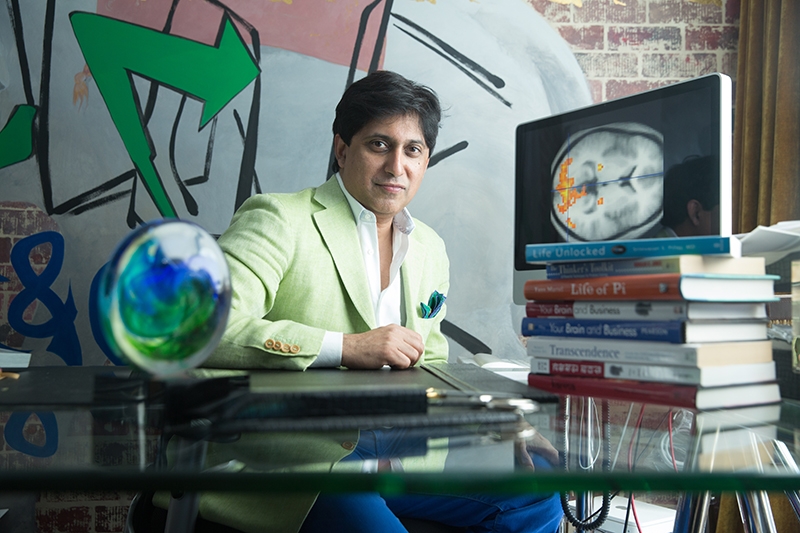Meet Dr. Srini Pillay—Harvard-Trained psychiatrist and brain researcher, McKinsey & Co. Think Tank member, CEO of NeuroBusiness Group, Chief Medical Officer and Co-Founder of Reulay—voted one of the Top 20 movers and shakers in leadership development in the world. Discover why everyone from global bankers and entrepreneurs to soccer moms are tuning in to his message.
Author, Psychiatrist, Coach, Brain Researcher, Musician, Provocateur/Poet
Dr. Srini Pillay is chief medical officer and co-founder of Reulay, an AI-driven digital therapeutics company that is developing strategies to enhance well-being and healthy longevity. He is a world-renowned keynote speaker, lecturer, author, consultant and Harvard trained psychiatrist. He is known for combining “head and heart” (figuratively and literally) in an approach to personal development and goal mastery that blends science, spirituality, and horns-grabbing joie de vivre to combat the stresses faced by ambitious and high-achieving people in academia, business, and life.
After graduating at the top of his class from medical school in South Africa, he received a Medical Research Council Scholarship to study the neurochemistry of panic. Thereafter, he completed his residency in psychiatry at McLean Hospital—Harvard’s largest freestanding psychiatric hospital—with the most accolades ever given to a single resident. Srini also completed fellowships in Psychopharmacology, Structural Brain Imaging and Functional Brain Imaging.
He formerly served as Assistant Professor of Psychiatry (Part-Time) at Harvard Medical School and was Director of the Outpatient Anxiety Disorders Program at McLean Hospital and was Director of the Panic Disorders Research Program in the Brain Imaging Center. There, he spent 17 years studying functional brain imaging. During this time, he maintained an active clinical practice, which he continues today.
Currently, Srini is a member of the by-invitation-only “Group for Advancement of Psychiatry”, an American professional organization of psychiatrists dedicated to shaping psychiatric thinking, public programs and clinical practice in mental health. The founding group was seeking a way in which American psychiatry could give more forceful leadership, both medically and socially, and as a member of the “Disasters and the World Committee”, Srini’s contributions include but are not limited to two chapters in a book called “Disaster Psychiatry”.
Srini is also in multiple collaborations on health-related projects. With Harvard Health, he is developing a model on mindset shifts for burnout. He is also in current collaborations with programmers from Google and MIT to develop technologies that reduce anxiety.
In addition to his work in psychiatry, Srini has also consulted regularly for the past 10 years to companies that invest in biotechnology to assess medications in various illnesses including cancer, heart disease, and stroke.
Srini has a talent for translating complex research findings in psychiatry for consumption by the general public—in print and through radio, television, and the web. He enlightens and inspires with equal measures of insight, humor, and deep human compassion.
He received the “Books for a Better Life” award for his book, Life Unlocked: 7 Revolutionary Lessons to Overcome Fear (Rodale, 2010). This award was conceived with the purpose of recognizing authors across a wide range of disciplines who have had significant influence on human development over the past 75 years. (Prior recipients include Brene Brown and Jill Bolte Taylor.)
With so many business leaders among his clients, Dr. Pillay also became a certified master executive coach. As an expert in brain-based leadership development and the CEO of NeuroBusiness Group, he has also written Your Brain and Business: The Neuroscience of Great Leaders (FT Press, 2011.)
Srini prepares and delivers top-rated leadership development courses and plenaries for clients such as: Novartis, Lockheed Martin, Willis Group, Prudential, Pfizer, Fortune 500 Food/Beverage Companies, and some of the largest Fortune 100 consulting firms. He has also trained leaders at The MITRE Corporation, The Department of Defense and The Institute for Law Enforcement with great acclaim. When the UN, World Bank and the International Monetary Fund seek to empower their leaders, they call Srini Pillay. He speaks and teaches throughout the US, Canada, London, Paris, Switzerland, India, Greece and Brazil. Being an internationally recognized expert in applied brain science and human behavior, he addresses both specialists and general audiences on these topics throughout the world. In 2016, Srini was invited by McKinsey & Company to join their new “Consortium for Adult Learning and Development” and also is one of the advisors on a new “think tank” exploring the benefits of mindfulness in business. Srini teaches in Executive Education at Harvard Business School and Duke Corporate Education.
He has been an expert guest for CNN, Fox, NPR, The New York Times, Washington Post, Huffington Post, Harvard Business School, Cosmopolitan, Elle, Forbes, Fortune, Business Insider and many other news outlets in a variety of media and is known as a highly entertaining guest.
His upcoming book, Tinker, Dabble, Doodle, Try: Unlock the Power of an Unfocused Mind explains how you can harness your mind’s innate tendency to wander, stall, rest, and unfocus and become more productive—in the boardroom, living room, or classroom. It will be published by Random House (Ballantine) in 2017.
With “renaissance man” bona fides, Srini is an unabashed “dabbler,” a polymath, an accomplished musician, award-winning poet and gourmand who frequently exports insights from neuroscience to other art forms—such as a new program that will combine neuroscience and music for use in corporate development.

HIRE DR. SRINI PILLAY
what people are saying
A wonderful job translating neuroscience into layman’s terms, vividly explaining how the human mind works. Can help anyone understand their fears and how to overcome them.
Steve Ward, Tough Love/VH1
Easily the smartest guy I’ve ever met. We know what we should be doing. Srini helps us see why we’re not doing it—and how to change that.
Bob Irvin Harvard Psychiatrist
Dr. Pillay gives us a book that is part owner's manual and part ‘cookbook’ to contemplate change—and improvements in how we use our brain based on current science.
Michael J. Russell
I found great value in Dr. Pillay’s easy to understand audio materials and benefited from the personalized feedback he provided during a webinar. I sense more calm and concentration in my work habits. I look forward to more progress in my partnership with my brain to tap my personal potential.
Helena Kaufman
Our ‘Neuro-Doc Rock Star.’ A mad scientist complete with a crazy haircut who gets a huge response from our audiences. You understand from the first minute—this guy is brilliant!

